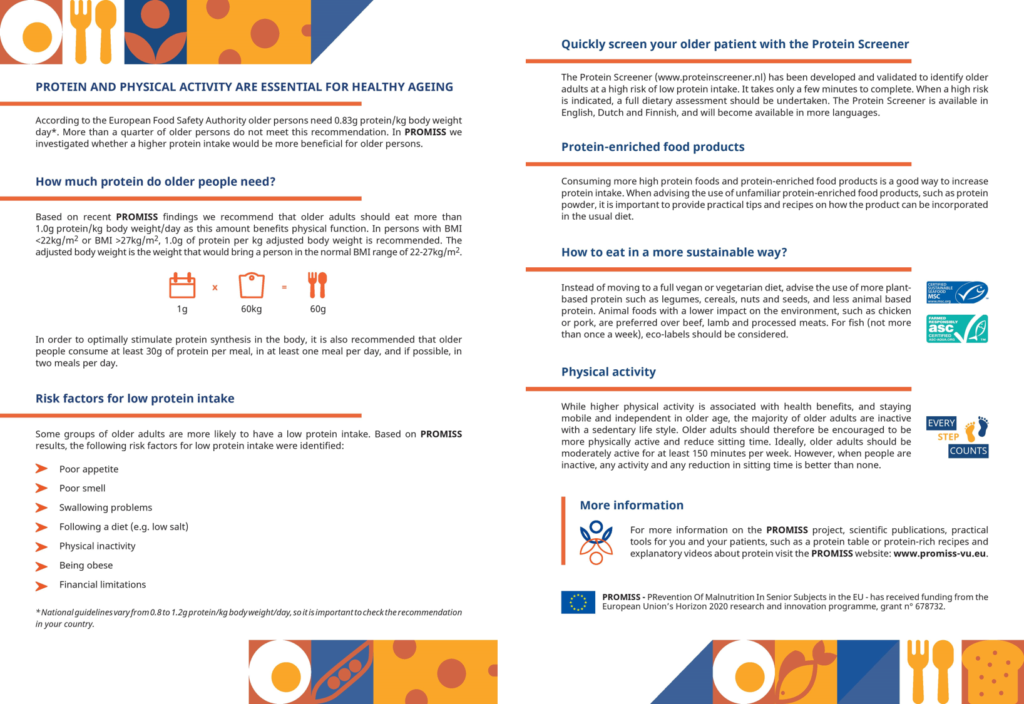Dietitians
Download the PROMISS strategies for Dietitians as .pdf (click here)
You can also find a Dutch version of the brochure here (Link).
PROTEIN AND PHYSICAL ACTIVITY ARE ESSENTIAL FOR HEALTHY AGEING
According to the European Food Safety Authority older persons need 0.83g protein/kg body weight/day*. More than a quarter of older persons do not meet this recommendation. In PROMISS we investigated whether a higher protein intake would be more beneficial for older persons.
How much protein do older people need?
Based on recent PROMISS findings we recommend that older adults should eat more than 1.0g protein/kg body weight/day as this amount benefits physical function. In persons with BMI <22 kg/m2 or BMI >27 kg/m2, 1.0g of protein per kg adjusted body weight is recommended. The adjusted body weight is the weight that would bring a person in the normal BMI range of 22-27 kg/m2.
In order to optimally stimulate protein synthesis in the body, it is also recommended that older people consume at least 30 g of protein per meal, in at least one meal per day, and if possible, in two meals per day.
Risk factors for low protein intake
Some groups of older adults are more likely to have a low protein intake. Based on PROMISS results, the following risk factors for low protein intake were identified:
- Poor appetite
- Poor smell
- Swallowing problems
- Following a diet (e.g. low salt)
- Physical inactivity
- Being obese
- Financial limitations
Quickly screen your older patient with the Protein Screener
The Protein Screener (www.proteinscreener.nl) has been developed and validated to identify older adults at a high risk of low protein intake. It takes only a few minutes to complete. When a high risk is indicated, a full dietary assessment should be undertaken. The Protein Screener is available in English, Dutch and Finnish, and will become available in more languages.
Protein-enriched food products
Consuming more high protein foods and protein-enriched food products is a good way to increase protein intake. When advising the use of unfamiliar protein-enriched food products,. such as protein powder, it is important to provide practical tips and recipes on how the product can be incorporated in the usual diet.
How to eat in a more sustainable way?
Instead of moving to a full vegan or vegetarian diet, advise the use of more plant-based protein such as legumes, cereals, nuts and seeds, and less animal based protein. Animal foods with a lower impact on the environment, such as chicken or pork, are preferred over beef, lamb and processed meats. For fish (not more than once a week), eco-labels should be considered.
Physical activity
While higher physical activity is associated with health benefits, and staying mobile and independent in older age, the majority of older adults are inactive with a sedentary life style. Older adults should therefore be encouraged to be more physically active and reduce sitting time. Ideally, older adults should be moderately active for at least 150 minutes per week. However, when people are inactive, any activity and any reduction in sitting time is better than none.
*National guidelines vary from 0.8 to 1.2g protein/kg body weight/day, so it is important to check the recommendation in your country.
